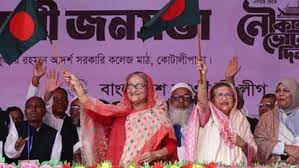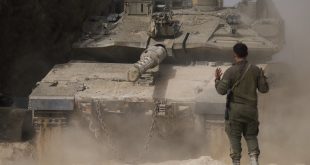New Delhi: Bangladesh (Bangladesh) will vote in the general elections on Sunday, in which Prime Minister Sheikh Hasina is expected to win for the fourth consecutive time due to the absence of the main opposition Bangladesh Nationalist Party. Opposition party BNP has boycotted the elections and called for a 48-hour nationwide strike against the “illegal government”.
The Election Commission said that it has almost completed preparations for voting in 300 constituencies across the country and has also ensured security arrangements. According to the Election Commission, a total of 11.96 crore registered voters will exercise their franchise in the voting to be held on Sunday at more than 42,000 polling stations.
More than 1,500 candidates from 27 political parties are contesting in the elections and apart from them there are also 436 independent candidates. More than 100 foreign observers, including three observers from India, will monitor the 12th general elections. This election is being conducted amidst tight security. Chief Election Commissioner of Bangladesh Kazi Habibul Awal said, “We want our general elections to be seen not only at the national level but also at the international level. Bangladesh is a member of the United Nations and has also signed various international documents.
Voting will start at 8 am
The Election Commission said that voting will start at 8 in the morning and end at 5 in the evening. The election results are expected to be declared on the morning of January 8. Prime Minister Hasina’s ruling Awami League is expected to win for the fourth consecutive time as the party of former Prime Minister Khaleda Zia (78) has boycotted the elections. Khaleda is under house arrest after being convicted on corruption charges. Hasina, 76, in a nationally televised address this week, urged pro-democracy and law-abiding parties not to give air to such views that would “hinder” the country’s constitutional process.
BNP boycotted the elections
BNP has called for a 48-hour nationwide strike from Saturday. The number of vehicles on the roads is less than other days but despite the fear of arson, public vehicles are running on the roads. The opposition Jatiya Party is also included in the 27 parties contesting the elections. The rest are members of the ruling Awami League-led coalition. BNP has called for a 48-hour nationwide general strike from 6 am on January 6 to 6 am on January 8, boycotting the elections. The party claims that no election will be fair and credible under the current government.
Prime Minister Sheikh Hasina promised economic development
Announcing the strike, BNP spokesperson Ruhul Kabir Rizvi said its objective was “to demand the resignation of this illegal government, the formation of a neutral government and the release of all party leaders and workers from jail” in view of the elections. Hasina government has arrested thousands of opposition leaders and supporters. Human rights groups condemned the move, calling it an attempt to paralyze the opposition. Prime Minister Hasina said that if Awami League comes to power, it will ensure economic and social development of the people of the country.
Authorities deployed military troops across the country two days in advance to “assist civil administration” in maintaining peace and order during the voting. Despite tight security arrangements, unidentified people set fire to vacant polling stations in four of the 64 administrative districts, while in another district BNP workers clashed with the police in which five people were injured on Friday. According to fire service data, there were at least 14 arson attacks in the 16 hours till 9.30 am on Saturday.
Sheikh Hasina has been in power since 2009
At least four people died in a fire incident on a passenger train near Dhaka on Friday night. BNP has demanded a UN monitored investigation into this incident. Hasina has been in power since 2009 and won the last election in December 2019, which was marred by deadly violence and allegations of election rigging. BNP had also boycotted the elections in 2014 but took part in the 2019 elections, which party leaders called a mistake and alleged massive rigging in the elections.
After the Russia-Ukraine war, Bangladesh’s economy declined rapidly due to rising import prices of fuel and food items, due to which Bangladesh had to turn to the International Monetary Fund for a relief package of $ 4.7 billion last year.
 Indian Thought Latest News & Views
Indian Thought Latest News & Views



